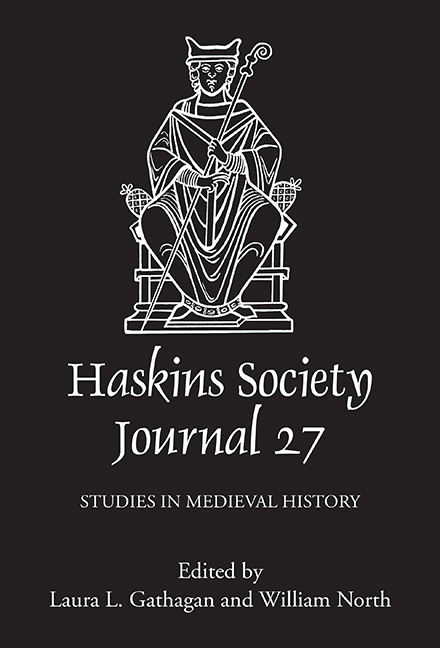Book contents
- Frontmatter
- Contents
- List of Figures
- Editors’ Note
- Abbreviations
- 1 Rural Settlement in Roman Britain and Its Significance for the Early Medieval Period
- 2 Holy Relics, Authority, and Legitimacy in Ottonian Germany and Anglo-Saxon England
- 3 Beyond the Obvious: Ælfric and the Authority of Bede
- 4 Byrhtferth’s Historia Regum and the Transformation of the Alfredian Past
- 5 Geoffrey le Bel of Anjou and Political Inheritance in the Anglo-Norman Realm
- 6 Observations on the Twelfth-century Historia of Alfred of Beverley
- 7 Helena, Constantine, and the Angevin Desire for Jerusalem
- 8 The Revolts of the Embriaco and the Fall of the County of Tripoli
- 9 Jewish Women, Christian Women, and Credit in Thirteenth-Century Catalonia
- 10 Military Entrepreneurs in the Armies of Edward I (1272–1307) of England
3 - Beyond the Obvious: Ælfric and the Authority of Bede
Published online by Cambridge University Press: 07 May 2022
- Frontmatter
- Contents
- List of Figures
- Editors’ Note
- Abbreviations
- 1 Rural Settlement in Roman Britain and Its Significance for the Early Medieval Period
- 2 Holy Relics, Authority, and Legitimacy in Ottonian Germany and Anglo-Saxon England
- 3 Beyond the Obvious: Ælfric and the Authority of Bede
- 4 Byrhtferth’s Historia Regum and the Transformation of the Alfredian Past
- 5 Geoffrey le Bel of Anjou and Political Inheritance in the Anglo-Norman Realm
- 6 Observations on the Twelfth-century Historia of Alfred of Beverley
- 7 Helena, Constantine, and the Angevin Desire for Jerusalem
- 8 The Revolts of the Embriaco and the Fall of the County of Tripoli
- 9 Jewish Women, Christian Women, and Credit in Thirteenth-Century Catalonia
- 10 Military Entrepreneurs in the Armies of Edward I (1272–1307) of England
Summary
In 989, two years after he had transferred from the cathedral monastery of Old Minster Winchester, that great powerhouse of the Anglo-Saxon Benedictine Reform, to the much more modest monastery of Cerne Abbas in Dorset, Ælfric, then only a monk and masspriest, wrote a letter to Sigeric, Archbishop of Canterbury. As was appropriate for a letter from one ecclesiastic to another, this was in Latin, and the tone was suitably deferential and humble. But the contents of the manuscript which the covering Latin letter sought to explain and justify departed from normal practice. What Ælfric was sending to Sigeric and in effect commending to him was a collection of forty homilies, mostly on the gospel lections for the day, organized according to the cycle of the church's year, and written in Old English. On the face of it, this might not seem to be innovative since preachers had to use the vernacular, after all, when addressing lay congregations. But what Ælfric had done was to produce a systematic collection of texts in the vernacular which embodied the patristically-based traditions that were characteristic of the Benedictine Reform as he had known it at Winchester. The reformers’ adoption of these traditions, following the example of the Carolingian Reform which inspired the Anglo-Saxon one, had the same aim as did the Carolingians: to improve the standards of scholarship within the monasteries as the educational centres of the day; to eliminate error by going back to the great authorities; and thus in the long run to raise the standards of teaching and preaching within the church as a whole.
Sets of Latin homilies within this tradition had come into England with the Reform, and it is clear that they had been central to Ælfric's own formation as a monk while at Winchester. But, as far as we know, before Ælfric no one in England had worked with these materials to produce new sets of homilies. Now Ælfric was doing so, not in Latin, as the Carolingians had done in their successive homily compilations within this tradition, but in the vernacular. Here was the innovation: an organized collection of homilies, in effect a small selective homiliary, firmly within the Reform tradition as defined within the Latin-dominated world of Anglo-Saxon Benedictine monasticism; composed using precisely the same techniques as Ælfric's Latin models; but with the striking difference that they were in the vernacular.
- Type
- Chapter
- Information
- The Haskins Society Journal 272015. Studies in Medieval History, pp. 39 - 54Publisher: Boydell & BrewerPrint publication year: 2016



